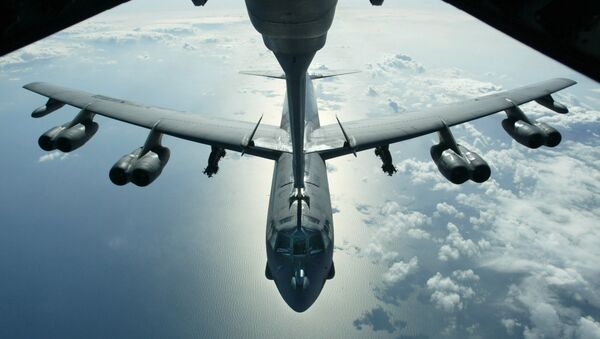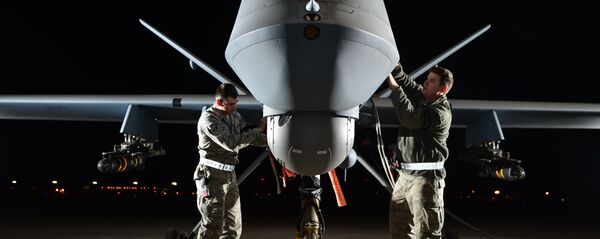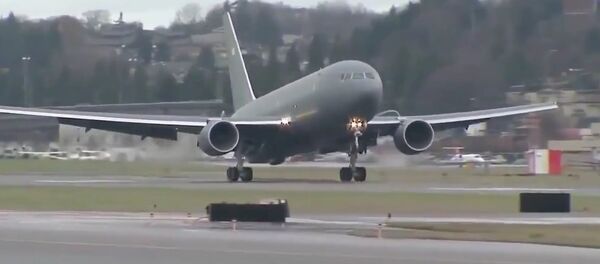The Pentagon has 115 acquisition and cross-servicing agreements (ACSAs), bilateral treaties providing US logistical support to various allies, around the world. Of those, 37 are due to be audited before the month is out, the IG announced in a letter dated January 28: 26 through US Africa Command (AFRICOM) and 11 through US Central Command (CENTCOM), the latter of which covers much of Southwest and Central Asia, including Yemen, Syria, Iraq, Pakistan and Afghanistan.
That letter, sent to AFRICOM, CENTCOM and the Defense Logistics Agency, says the probe will "determine whether the Defense Logistics Agency-Energy and supporting commands are billing and obtaining full reimbursement from partner nations for refueling missions within the US Central Command and US Africa Command areas of responsibility."
The letter notes three audit sites: Stuttgart, Germany, the headquarters of AFRICOM; Tampa, Florida, the headquarters of CENTCOM; and Manama, Bahrain, where the headquarters of US Naval Forces Central Command, a component of CENTCOM, are located.
Stars and Stripes noted that since 2013, US Air Force KC-135 Stratotankers have regularly flown support missions from Spain for the French military's counterterrorism operations in western Africa, primarily in Mali and Niger, also flying support for Saudi Arabia and its allies engaged in operations in Yemen and US allies flying sorties against Daesh in Iraq and Syria.
"Overall our mission is global reach, and we hope to help our allies by extending their flight time that is necessary to complete their mission," the Air Force said in a September statement about refueling operations in Africa.
Last month, the Pentagon was forced to admit that "errors in accounting" required them to bill Saudi Arabia and the UAE for $36.8 million in fuel and $294.3 million in flight hours after they underpaid for US refueling missions that kept their warplanes in the air. Both Riyadh and Abu Dhabi are engaged in a brutal fight in Yemen against the Houthi movement, a rebellion led by Zaidi Shiite Muslims against the Sunni, Riyadh-aligned central government of Yemen. That government fled the country in early 2015 amid a Houthi invasion of the capital city of Sana'a, and the war since has killed tens of thousands and placed millions in danger of starvation.
US lawmakers, media and the general public have largely ignored the conflict, which the US has supported via logistical coordination, including refueling Saudi and Emirati planes, until only recently. Less publicly acknowledged has been the US' involvement in the ground war and crucial assistance in providing intelligence and targeting information. When a highly publicized Saudi air strike that killed a school bus full of Yemeni children in August 2018 was revealed to have been made with a US-made bomb, followed by the November revelation that Riyadh was revealed to have played a major role in the murder of Saudi journalist and US resident Jamal Khashoggi in Turkey, scrutiny of the Saudi leadership — and Washington's close partnership with them — increased. In December, US lawmakers moved to force the White House to end support for the Saudi-led war in Yemen; the move failed but was reintroduced on Wednesday, Sputnik reported.
"Congress never authorized US involvement in Yemen, but DoD still provided refueling services for Saudi airstrikes that cost thousands of lives — and then forgot to send the Saudis the whole bill," Massachusetts Democratic Sen. Elizabeth Warren, a 2020 presidential hopeful and member of the Senate Armed Services Committee, told the Navy Times Tuesday. "I'm glad the inspector general will investigate. We need to hold the administration accountable for the operations it supports overseas and how our taxpayer dollars are being used."
Author and journalist Daniel Lazare told Sputnik Wednesday that while the Pentagon's budget mismanagement is notable, the larger issue is its prioritization of global reach.
"Congress is clearly fine with both since it rewards the Defense Department with more and more money every year, but citizens are in the dark," Lazare said. "Few Americans know that the US enabled the Saudi-UAE assault on Yemen, the poorest country in the Middle East, by providing mid-air refueling for both countries' warplanes. No one knew that it was aiding French combat missions in Mali and Niger by providing mid-air refueling as well, and no one had a clue that the US was engaging in combat missions itself until an Islamic State ambush killed four American soldiers in [Niger] in 2017."
"Essentially, there is no place on Earth in which the US is not engaged, particularly along the borders of a few remaining ‘revisionist' powers," Lazare said, invoking former Defense Secretary Jim Mattis' term for Russia and China in the National Defense Strategy published in January 2018. That document laid out the Pentagon's belief that "Inter-state strategic competition, not terrorism, is now the primary concern in US national security."
"The central challenge to US prosperity and security is the reemergence of long-term, strategic competition by what the National Security Strategy classifies as revisionist powers. It is increasingly clear that China and Russia want to shape a world consistent with their authoritarian model — gaining veto authority over other nations' economic, diplomatic and security decisions," the document states.
Lazare told Sputnik that US global reach and engagement is "a recipe for endless conflict, yet it's all unfolded with remarkably little debate. When Donald Trump made a half-hearted stab at rolling back some of America's military commitments, Democrats, the corporate media and the intelligence agencies responded by attacking him as a Kremlin stooge and nearly destroyed his administration. But that didn't change the fact that the US is still grossly over-extended, which is why the administration has had no choice but to negotiate a peace settlement in Afghanistan, to push for a nuclear accord with North Korea and to proceed ahead with Syrian troop withdrawal."
The political situation in Washington is "volatile," the author said, "so the big question is whether a global military machine might somehow still stumble into a conflict with Russia or China. It's crazy but far from impossible."






